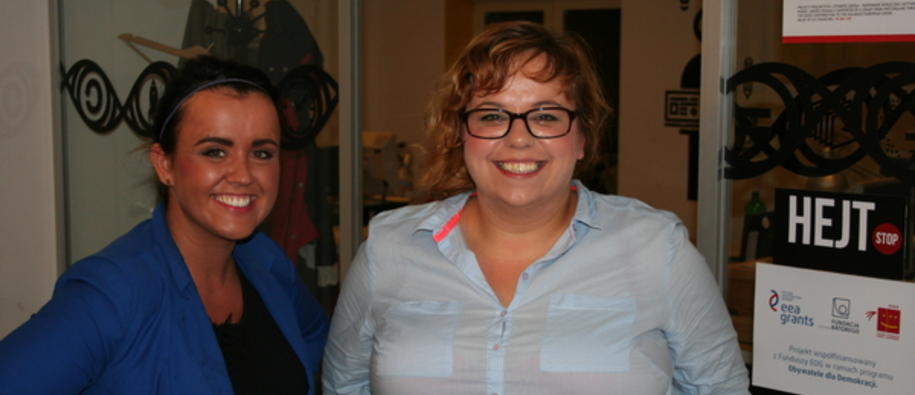The Hate Stop is a campaign dedicated to removing hate speech from public spaces. The problem is widespread; hateful inscriptions and graffiti can be found in all Polish towns – on buildings, fences and pavements. People of different races, religions – especially Jews and Muslims - and LGBT (lesbian, gay, bisexual, and transgender) persons are the most common targets. Although most Poles do not agree with these hateful messages, the reasons behind the racism, homophobia and anti-Semitism are complex:
“Poland is a rather homogenous country and has only been a free society the last 25 years. The interaction of cultures is not popular among all groups of society. Most of the prejudice – like –anti-Semitism is invented and not grounded in real historical events, but in distortions,” Joanna explains.
This is why the Polska Association receives funding from Iceland, Liechtenstein and Norway through the NGO fund in Poland to take action against signs of hate speech in the public sphere. Since March this year, photographs with hateful inscriptions are displayed as billboard ads next to the places the inscriptions were actually written. ‘Your passivity promotes hate’ is printed on each billboard. When the inscriptions are taken out of their context they become more visible and make people more inclined to act.
“This campaign gives people an idea of the scope of the problem,” Joanna says.
Involving local communities
The objective of the project is not only to create awareness, but also to make people act. A website has been established where volunteers and the general public can take pictures and report about instances of hate speech in public spaces. Around 730 reports on hateful graffiti in the public sphere have been submitted to the police or local authorities, out of which around 300 have been painted over. Around 75 of these were painted over by through the Hate Stop campaign. Joanna believes the current legislation needs to be changed:
“We report the instances to the police, but law enforcement is not yet sufficient. There is a need to change the law so that the owners have to remove hateful graffiti from their façades. We also need to make public money available to help those who cannot afford to remove the graffiti themselves.”
One specific incident six months ago of hateful graffiti close to the Polska Association’s offices illustrated how painting over hateful messages has a preventive effect. The office is located close to a Nigerian restaurant and the area has a large African community. When the restaurant was vandalised with racist graffiti, members of the local community – both Poles and people with minority backgrounds – were mobilised:
“Through social media we were able to gather around 50 people and paint over the graffiti 24 hours later. Since then, it has never come back,” Joanna says.
See the video from the event below:
Changing mind-sets
The Hate Stop campaign also has a Facebook page with nearly 15 000 followers, which is being used by volunteers to inform about fan sites and comments inciting violence and promoting hateful content. So far, around 2000 fan sites have been closed down and 20 000 comments have been removed on Facebook as a result of these activities. Twenty-eight public events where graffiti has been painted over have also been organised in Krakow, Koszalin, Łódź, Poznań, Warsaw, Wrocław, Katowice and Kielce.
The Hate Stop campaign has around 150 active volunteers. One of these volunteers is Milena Ołtarzewska. For her, the Hate Stop campaign is not only a cause, it is personal:
“Four years ago, my sister met a man from Nigeria. They are now married and six months ago their daughter was born. My niece is the apple of my eye, and when I see all the graffiti on different buildings it terrifies me. I do not want her to be a victim of that.”
Joanna has also a personal story behind her engagement. She grew up in a small town outside of Poznań in Western Poland, which had a large Jewish community before the war. She is personally saddened by the fact that intolerance is not only problem among the older generations, but for her own generation as well:
“My family has Jewish roots. Apart from my immediate grandparents, none of my family survived the war. In high school I started looking at my family’s history, and was horrified to see in my home town, there are few Jews left, but anti-Semitism is rampant. I cannot accept that.”
This is why the Hate Stop campaign is putting an emphasis on reaching out to young people. The outreach is showing results:
“We have an open house where many school children are doing their homework. Two 12 year old boys were expressing homophobic and anti-Semitic views. We sat down with them and talked about it, and now they are active in our campaign painting over hateful graffiti.”
About the project
The project receives € 74 250 from Iceland, Liechtenstein and Norway through the NGO fund in Poland. The project started March 2014 and will end January 2016, and is implemented in partnership with Saatchi & Staatchi Poland.
